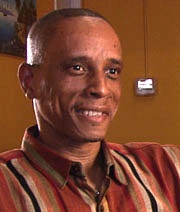 Inspirational speaker Orland Bishop speaks as part of the Global Oneness Tour, in Portland, May 8, from 5:30 to 9:30 at the Kennedy School Theater, 5736 NE 33rd Ave., and in Seattle, May 9, from 5 to 9 p.m., at the Museum of History and Industry, Mc Cundy Park at 2700 24th Ave. E.
Inspirational speaker Orland Bishop speaks as part of the Global Oneness Tour, in Portland, May 8, from 5:30 to 9:30 at the Kennedy School Theater, 5736 NE 33rd Ave., and in Seattle, May 9, from 5 to 9 p.m., at the Museum of History and Industry, Mc Cundy Park at 2700 24th Ave. E.
He is the founder and director of ShadeTree Multicultural Foundation in Los Angeles, where his new ways of negotiating urban truces and mentoring at-risk youth combine new ideas with traditional ways of knowledge.
The Skanner: What is it that you bring to the youth groups that you speak with?
Bishop: The impulse of my presentations – we use the term Ndaba. Ndaba is a Zulu term that translates as deep talk, or I have something to share. And that type of communication is to help remind a person of their importance in life, or their road in life. And part of the message we bring in our work of mentorship is to spark the intelligence of memory. What is it a person remembers as being authentic in their life? So that they can step into that as a devotion, as a service, and as a deep intention. So it is to awake a certain type of intention to participate in a collective process, that makes their life actually more meaningful. So it's a call to be present in the time in which a person lives and experiences their life.
 S: Mr. Bishop one of the stories we've been spending a lot of time on in Portland and Seattle is the difference between the African community and African American community, specifically. We have a very diverse African community of immigrants here who often feel that their identity is erased when it comes to programs that are made available for youth education and health care. I know you're from Guyana, and I wonder if you can speak a little bit to – what is the difference between, is there really a fundamental difference between what immigrant youth go through and what youth that are born and raised in Los Angeles, or Portland and Seattle go through?
S: Mr. Bishop one of the stories we've been spending a lot of time on in Portland and Seattle is the difference between the African community and African American community, specifically. We have a very diverse African community of immigrants here who often feel that their identity is erased when it comes to programs that are made available for youth education and health care. I know you're from Guyana, and I wonder if you can speak a little bit to – what is the difference between, is there really a fundamental difference between what immigrant youth go through and what youth that are born and raised in Los Angeles, or Portland and Seattle go through?
Bishop: Well the distinctions are clear, yes. The form of migration that a person takes, let's say the path of their life, creates for them a unique experience in soul and mind. So a person leaves on a journey of their own free will, they have a certain type of experience. But when people are forced into a certain movement, the way that those who are African American have been, their historical memory is a forced migration. That memory still lives with people. What is the nature of freedom, as an identity? You have to recover from something much deeper than just being in Seattle or Portland. They have to recover being in the womb of their ancestors, and put into context a self-reference that includes that historical story. Memory is not confined to what a person went through in their own limited existence. It includes the historical and the ancestral mind. So there's a distinction in the inner life of people about who they are. If people have not gone through some of the experiences, we can then expect them to behave differently. Behavior comes out of the psychology. The emotional history lives there and the cyclical connections are something that some people can struggle to find a context for. Who am I, given the history that I've inherited? And I think to some degree we have to include in the education of people knowledge about the initiation that their ancestors went through, in this journey across the Atlantic to the Americas. So I think young people in our cultural time want to navigate a deeper connection to their own life and their identity, but their education is not complementing that. Their education is not really allowing them to address the nature of the unique wound that they have. Education about getting a job is not going to heal that wound, it's not going to address it. And I think it's very shortsighted to suggest that people can just step out of this history and join a new social attitude and be well without dealing with it. It's not realistic. The nature of reality is the fact that people inherit memories, just as they inherit genes and the genetic makeup of our family life. And we often say that in the physical body is five generations of memory, that people must, in a sense, come to understand and integrate in order to become a whole person, and to have an inner sense of freedom and identity that makes life more meaningful.
S: You're coming to Portland and Seattle as part of a multimedia and community tour, basically, by the Global Oneness Project, The New Narrative: Local Voices for a Global Future. Can you talk a little bit about that? How did you become involved with it?
Bishop: Well I was invited at an early point of the development of the project to do an interview on the idea of 'oneness.' And this in a sense is what I feel that the challenge of our time speaks to. Because people want to be in relationship to each other, or in community with each other, or even in agreement with each other. But in order to do that we must communicate, we must find the authentic voice. The intention of what I try to communicate through this oneness initiative is what is the seeking that a person must do in order to first experience their own unique contribution to the dialogue that has to be in the world? If people are talking about the future, a person must have a sense of purpose to be able to talk about the future. You can't talk about the future if you're hopeless, if you feel powerless. If life is meaningless to you then there's no conversation about the future. What people talk about is basically the conflict and the violence that they experience. And the isolation. So there's the intention of my involvement with the project was to explore what is oneness to the human being? And oneness to the human being begins with our voice, it begins with our speaking, say this is what I have to say, that I have to communicate something of meaning to the world, and then somebody has to listen, somebody has to take that speaking to be relevant and necessary, so at some point that unique contribution has to become a dialogue. And my intention is to raise the question what is the dialogue that will allow this veil that is keeping people isolated and in conflict to be raised? Why does the conflict not allow us to see a common future?






















































































































































































































































































































